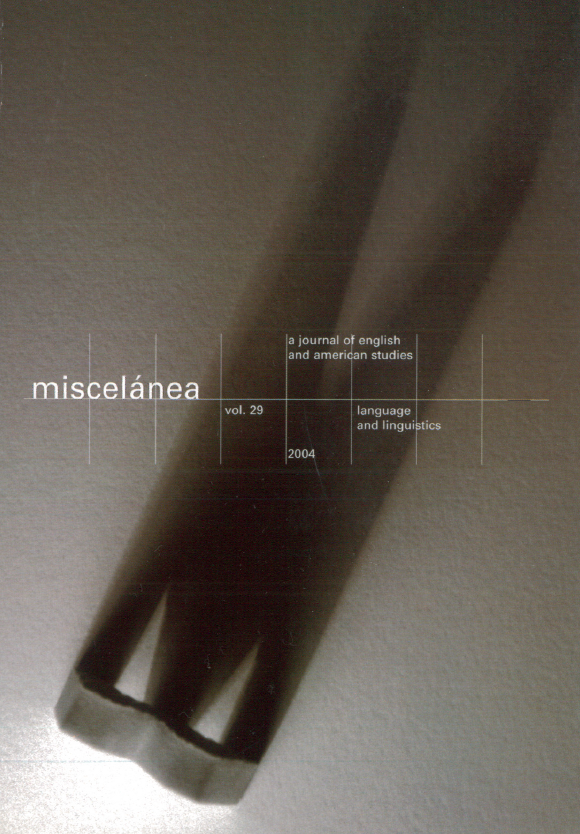"I do not wish to be valled auctour, but the pore compilatour": La difícil situación del poeta vernáculo medieval
DOI:
https://doi.org/10.26754/ojs_misc/mj.200410388Palabras clave:
medieval, Chaucer, Gower, codicología, glosas, autoríaResumen
Este artículo examina el cambio de actitud ante el papel del autor vernáculo en la Inglaterra y la Escocia del siglo XIV y principios del XV. El título de "auctour" (autor) estaba antes reservado al escritor de obras teológicas latinas, mientras que el escritor vernáculo se escondía tras varias apariencias, como el anonimato o la visión onírica, y se consideraba simplemente un modesto compilador o traductor de la obra de otros. El cambio hacia un autor seguro de sí mismo puede rastrearse no sólo en lo que escribieron, sino en cómo presentaron su trabajo en los manuscritos. Por ello examinaré las pruebas codicológicas, en particular el material de escritura, las diferentes escrituras, la mise-en-page (que tenía una función interpretativa), las glosas y otros indicios que apuntan al valor intrínseco del texto en su contexto manuscrito. Chaucer, Henryson y Gower son estudiados en detalle, ya que hicieron todo lo posible para que sus obras aparecieran en pergamino como textos autorizados, lo que sugiere que, a pesar de las protestas de modestia, se consideraban a sí mismos en vida "auctoures" (autores).
Descargas
Referencias
CAIE, Graham D. 1977. “The Significance of the Early Chaucer Manuscript Marginal Glosses (with special reference to the Wife of Bath’s Prologue)”. The Chaucer Review, 10: 350-360.
—. 1984. “The Significance of Marginal Glosses in the Earliest Manuscripts of the Canterbury Tales”. In Jeffrey, David L. (ed.). Chaucer and the Scriptural Tradition. Ottawa: Ottawa U. P.: 337-350.
—. (ed.). 2000a. The Old English Poem “Judgement Day II”. Woodbridge: D. S. Brewer.
—. 2000b. “The Inscribed Paisley Slates”. In Malden, John. (ed.). The Monastery and Abbey of Paisley. Paisley: Renfrewshire Local History Forum: 199-204.
CARRUTHERS, Mary. 1990. The Book of Memory: A Study of Memory in Medieval Culture. Cambridge: Cambridge U. P.
CLANCHY, Michael T. 1987. From Memory to Written Record: England 1066-1307. London: Edward Arnold.
COLEMAN, Janet. 1981. English Literature in History, 1350-1400. London: Hutchinson.
HANNA, Ralph, III. 1987. “Compilatio and the Wife of Bath: Latin backgrounds, Ricardian Texts”. In Minnis, A. J. (ed.): 1-11.
IRVINE, Martin. 1992. “‘Bothe text and gloss’: Manuscript Form, the Textuality of Commentary, and Chaucer’s Dream Poems”. In Morse, Charlotte Cook, Penelope Reed Doob and Marjorie Curry Woods. (eds.). The Uses of Manuscripts in Literary Studies: Essays in Memory of Judson Boyce Allen. Kalamazoo: Medieval Institute Publications (Western Michigan University): 81-119.
LEWIS, Robert Enzer. 1967. “Glosses to the Man of Law’s Tale from Pope Innocent III’s De Miseria Humane Conditionis”. Studies in Philology, 64: 1-16.
MINNIS, Alistair J. (1984) 1988. Medieval Theory of Authorship, 2nd ed. Aldershott: Wildwood House.
—. (ed.). 1989. Latin and Vernacular: Studies in Late Latin Medieval Texts and Manuscripts. Woodbridge: D.S.Brewer.
PARKES, Malcolm B. 1991. Scribes, Scripts and Readers: Studies in the Communication, Presentation and Dissemination of Medieval Texts. London: Hambledon Press.
PEARSALL, Derek. 1989. “Gower’s Latin in the Confessio Amantis”. In Minnis, A. J. (ed.): 13-25.
SILVIA, Daniel S., Jr. 1965. “Glosses to the Canterbury Tales from St Jerome’s Epistola contra Jovinianum”.
SMALLEY, Beryl. 1964. The Study of the Bible in the Middle Ages. Notre Dame: University of Notre Dame Press.
Descargas
Publicado
Número
Sección
Licencia
Derechos de autor 2004 Graham D. Caie

Esta obra está bajo una licencia internacional Creative Commons Atribución-NoComercial 4.0.


